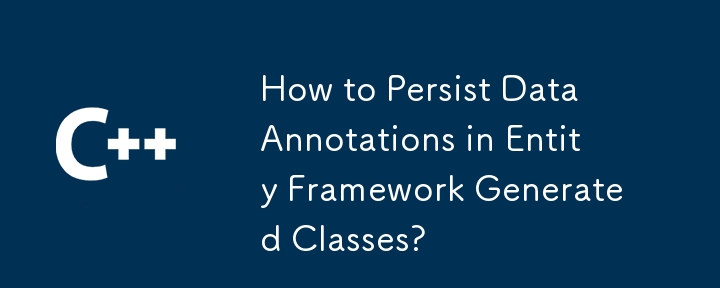Home >Backend Development >C++ >How to Persist Data Annotations in Entity Framework Generated Classes?
How to Persist Data Annotations in Entity Framework Generated Classes?
- Patricia ArquetteOriginal
- 2025-01-01 12:18:111027browse

Preserving Data Annotations in Entity Framework Generated Code
Question:
How to add data annotations to a class generated by Entity Framework (EF) that persist after code regeneration?
Context:
Consider a class generated by EF:
public partial class ItemRequest
{
public int RequestId { get; set; }
}
Modifying this code directly to add annotations (e.g., [Required]) will be overwritten on subsequent code generation.
Answer:
EF generates classes as partial classes. Utilizing this, we can create a separate partial class with the desired data annotations:
using System.ComponentModel;
using System.ComponentModel.DataAnnotations;
// Ensure the namespace matches the original class
namespace MvcApplication1.Models
{
// Metadata class for data annotations
[MetadataType(typeof(ItemRequestMetaData))]
public partial class ItemRequest
{
}
public class ItemRequestMetaData
{
[Required]
public int RequestId { get; set; }
}
}
The MetadataType attribute links the ItemRequestMetaData class to the original ItemRequest class. This allows data annotations in ItemRequestMetaData to be applied to ItemRequest without modifying the generated code.
The above is the detailed content of How to Persist Data Annotations in Entity Framework Generated Classes?. For more information, please follow other related articles on the PHP Chinese website!
Related articles
See more- C++ compilation error: A header file is referenced multiple times, how to solve it?
- C++ compilation error: wrong function parameters, how to fix it?
- C++ error: The constructor must be declared in the public area, how to deal with it?
- Process management and thread synchronization in C++
- How to deal with data splitting problems in C++ development

